A Tale of Two Robert E. Howard Biographies
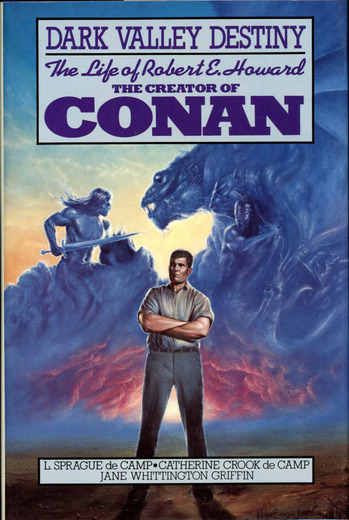 |
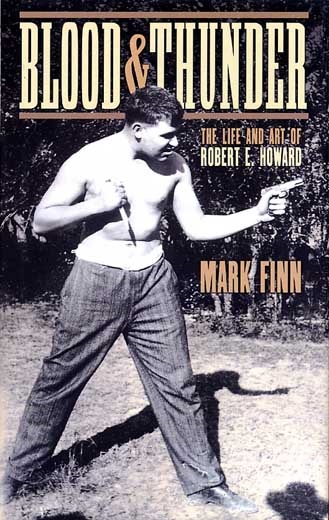 |
Not so long ago, in a galaxy really close by (in fact, our galaxy), there was a tale of two biographies of the same writer. This is how the story goes. Or at least, this is what I have gathered.
Once upon a time there was a Jedi-in-training (also known as a sci-fi writer) who, tempted by the Dark Side of the Force, figured out that he could make quite a bit of money in the fantasy genre. Tolkien was selling like gangbusters at the time, so why not? Robert E. Howard (REH), a long dead Golden Age pulp writer, had all of that Conan stuff just lying around begging to be exploited utilized. So off to work the Jedi went.
But, in pursuing this decades-long venture, said sci-fi writer unfortunately and eventually went completely over to the Dark Side — full Sith Lord territory. In time, by his own reckoning, he became the de facto spokesperson for what counted as canonical Conan. And further, as a self-made REH authority, he published his own biography of Howard. The Force was strong with this one.
Fortunately though, so the tale goes, the Force eventually balanced out. A small but growing band of Jedi — fully committed to the Light Side — fought vigorously against this Sith Lord, trying to demonstrate who the true REH actually was. In time, the evil Sith Lord was defeated, and died of natural causes. But the task of undoing his dark damage against REH’s legacy would take years. And eventually a very able Jedi warrior would come along and write a new REH biography that would, among other things, hopefully undo all the damage done by the first bio.
In sum, the Light Side of the Force overcame, and we can all now (hopefully) bathe in the purity of true REH.
THE END.
If you’re not familiar with this story, let me put some names to our characters. The perhaps unfairly-named Sith Lord is L. Sprague De Camp (1907–2000) and the later biographer is Mark Finn (1969–). I’ve been immersing myself in all things REH in the past few months. And in doing so it didn’t take long to begin to hear the rumbles of this epic “debate” (fight?) between DeCamp and what are sometimes called the “REH purists.” But it seemed to me that if one wanted to really get into the nitty-gritty of this debate, a good place to start was investigating De Camp’s older REH biography, and then compare it with Finn’s newer REH biography. Now that I’ve recently read both, that’s what I intend to briefly do here.
Dark Valley Destiny: The Life of Robert E. Howard (1983) was De Camp’s bio of REH and was actually co-authored with his wife Catherine Crook De Camp and one Jane Whittington Griffin. By this point in De Camp’s career, he had already been publishing REH stories for several years, as well as doing his “posthumous collaborations” of REH stories. If you compare these older publications with newer editions of REH books, it’s clear that De Camp and others took various liberties with REH’s stories. Needless to say, none of this put De Camp (and many more complaints could be added) in a very good light with REH purists.
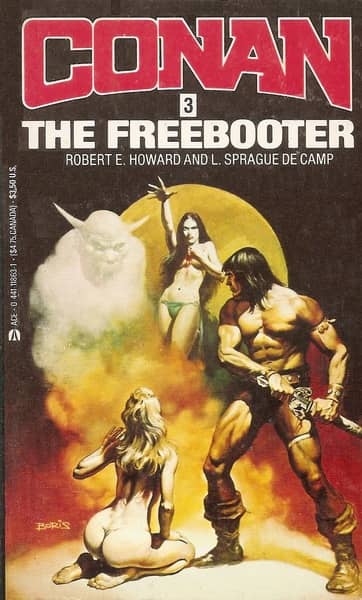 |
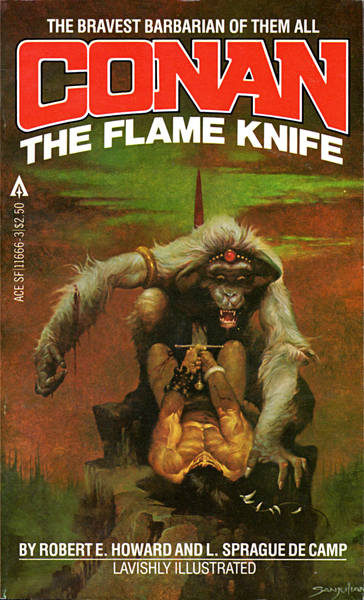 |
Art by Boris and Sanjulian
What to say about Dark Valley Destiny then? I read this REH biography first, which is still quite easy to obtain in good shape. In short, I enjoyed it. It was very clear and engaging. I was actually traveling in Germany when I read it, and whenever I took the train, with a couple of hours to kill, I would pick up De Camp’s biography. I found the details of REH’s life, as given by De Camp, engrossing. Though obviously not a thriller, it was quite a page-turner. At least part of the reason for this is De Camp’s fluid and engaging writing style. I’ve never read a De Camp novel, but I’ve read a few of his short stories and have found him to be a very competent writer. And in Dark Valley Destiny, when De Camp is at his best, he writes some really excellent prose.
In addition, rather than just giving a simple list of facts, De Camp provides a cohesive narrative that makes much sense. (I’ll come back to this in a bit.) And, occasionally, I thought De Camp also provided some engaging insight on REH. Moreover, as a scholar, I highly appreciated the heavy footnoting. Granted, many of the citations were to interviews but De Camp struck me as someone who at least attempted to be objective. (I’ll come back to this as well.)
Again, in short, I enjoyed this biography. But it had some very annoying aspects as well.
First, I often tired of De Camp’s sort of armchair-Freudian-psycho-analysis. I won’t go into the details of REH’s life, but he clearly had a close relationship with his mother. And coming back to De Camp’s overall REH narrative I alluded to before, De Camp often would heavily suggest and emphasize what he saw as sort of pent-up sexual issues within REH’s life related to this relationship. I’m not criticizing this suggestion in itself. In fact, I’m sure that De Camp was onto something. But De Camp often veered from competent history into mind-reading, all-knowing prophecy of REH’s intentions and personal issues. Give me a break!
Which leads me to the other annoying aspect. De Camp often comes off as somewhat of a pompous jerk with his “expert” opinions. Though I think he attempts to be objective, his conclusions are often presented as unquestionable. And, moreover, even as someone who considers himself an REH amateur, I think De Camp was just dead wrong on some things. For example, on the topic Howard’s poetry. I don’t consider myself a poetry connoisseur — not by a long shot. But I think REH’s poetry is quite good. And once you’ve read some of it, you can begin to see REH’s poetic flare in all of his writing, including his Conan tales. That being said, a comment like the following from De Camp just struck me as completely missing REH:
Some of Robert Howard’s friends, including Lovecraft, have said that Howard was primarily a poet. We disagree. We consider him a great storyteller first and foremost, and one who made his prose soar at times because he brought poetry to it. [. . .] At times his sentences have the simple and sustained rhythmic roll that we associate with the King James Bible, possibly because in childhood his parents often read to him from the Old Testament. (p. 244)
I would venture, in my humble opinion, that REH was a poet first and a storyteller second. Furthermore, I doubt that REH’s poetical abilities can be simply chalked up to his parents reading Shakespearean-English biblical prose at an early age. But there you go — De Camp has spoken.
Let’s move onto the next REH bio: Blood & Thunder: The Life and Art of Robert E. Howard (2013) by Mark Finn. I also highly enjoyed this biography. Like De Camp, Mark Finn is a very capable writer. His online bio shows some genre fiction publications, though I’ve never read any of them. Finn’s prose are also quite good and he seems at his best when he gets into a sort of conversational, hey-it’s-just-us-guys-and-gals-talking-here tone.
But Finn’s biography soars above De Camp’s in relating historical details more objectively and even-handedly. Thankfully, Finn doesn’t include any of the pseudo- psycho-babble that De Camp loved to parley in. Though Finn does straightforwardly deal with REH’s relationship with his mother, and his relationship with other women (I should say “with one other woman”). Given this superior historical handling, it’s ironic that Finn’s bio is not footnoted like De Camp’s, though it does have excellent indices. (Lesson to scholarly self: heavy footnoting does not necessarily mean a more accurate and scholarly work.) Like De Camp, Finn also provides more than bare historical facts. He provides an overall narrative of Howard as a Texas writer. This was a very interesting take, and a much more convincing one than De Camp’s Freudian meta-gloss. In consequence, Finn’s bio offers a lot of good Texas history in building on REH’s personal story that I found really intriguing as well.
Lastly, given that Finn is obviously part of the “good Jedi” camp of REH purists, I found his discussion of De Camp, and De Camp’s involvement in pushing REH and Conan, to be surprisingly charitable. Finn does bring De Camp in for a proper spanking, but the historical evidence provided gives Finn more than sufficient justification for De Camp to get his just rewards here. As Finn makes clear though, it will probably be years before the De Camp REH, with its misinformed bits, will fade away (if ever).
So De Camp is clearly the bad guy in this story. But I’d like to offer a brief counter.
It’s hard not to see a parallel between De Camp and the REH purists, and August Derleth and the H. P. Lovecraft purists. Like De Camp, Derleth saw a Golden Age pulp author being under-appreciated and possibly in danger of being forgotten. Derleth also did his share of “posthumous collaborations” with Lovecraft material. And like De Camp, plenty of Lovecraft purists saw Derleth as messing up and obscuring the true Lovecraft.
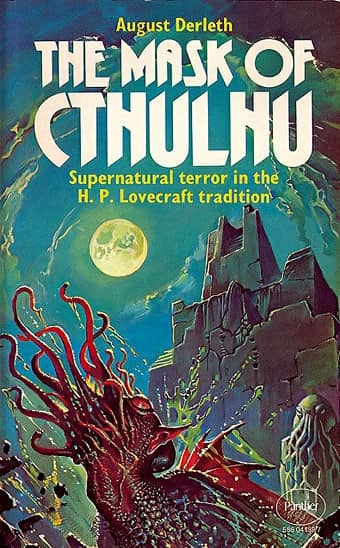 |
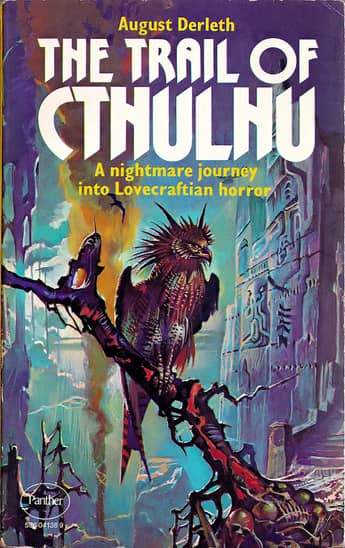 |
Art by Bruce Pennington
All this is probably true: for both Derleth and De Camp. That being said, one wonders if either REH or Lovecraft would have been forgotten (or been rediscovered much later) if these guys hadn’t come along and made use of this older material.
That doesn’t excuse their misuse of these authors (if either case was misuse), but I think we should at least acknowledge their positive contributions (mixed they may be) in helping to revive them. Would REH’s works still be around today and appreciated if it hadn’t been for De Camp? Probably. But it’s clear that De Camp’s Conan pastiches brought REH to the attention of many new readers. And that’s something, isn’t it?
In sum, Blood & Thunder: The Life and Art of Robert E. Howard by Mark Finn is a superior biography. It’s much more historically accurate and even-handed than De Camp’s Dark Valley Destiny. I would rank De Camp as a little more of an engaging writer. But this one pro doesn’t come close to evening the scales, much less tipping them. I do hope that De Camp’s biography will continue to be read in future years, though. At the very least, it makes the story of REH and his legacy much more intriguing.
Which makes sense.
How interesting would Star Wars have been without a Dark Side?
Thanks for this interesting article James. My main Conan reading source back in the day was the sphere books series done by De Camp and one or two by Carter, so until the purist debate came up I was blissfully unaware. Having recently gone through The conquering Sword of Conan etc with many years elapsed in between my initial reading, nothing specifically jumped out at me. I suppose only side by side comparison would reveal the differences.
I also tend to think that while De Camp may have done some damage (apparently) he did a lot of good keeping the flame alive. In my past where quantity sometimes outweighed quality the story fragments and rehashes of other stories into Conan hit the spot. Same with many of the pastiches. Maybe I should do a comprehensive re-read and compare to actually understand the differences.
Glad you enjoyed it Tiberius. I also haven’t done a side-by-side comparison so I personally am not as invested in all the REH hubbub as the purists are. I’m sympathetic to the purist perspective but appreciative of De Camp’s “keeping the flame alive” so to speak.
I read Dark Valley Destiny last year and had much the same reactions. I haven’t read Blood & Thunder, but now I see that I need to.
Jane Whittington Griffin was a psychologist who came originally from Eastland, a town near Cross Plains. (Strangely enough, I’m friends with a psychology professor from Eastland, but he’s never heard of her.) One wonders how much she actually contributed. Certainly her creds lend the book a measure of professionalism and authenticity.
Even with all the De Camps’ amateur psychologizing, I got the impression that REH wasn’t marked so much by a Freudian attachment to his mother as by fear of change, inability live on his own, and horror of death. The way he reacted to the death of his dog was especially striking. Also, his father seemed just as bent on “protecting” (that is, isolating) him as his mother.
Engaging in my own reckless armchair psychologizing, I opine that REH was autistic. Given the fact that I’m autistic myself, I might just be projecting, but the disorder can express itself in many ways, and I think a lot of evidence points in that direction. In any event, I think that REH’s biography definitely admits other constructions than the one De Camp imposes.
Thanks for the info Raphael. I may’ve been unfair in characterizing the De Camps’ diagnosis as Freudian. I meant the adjective more as a traditional stereotype of the expert psychiatrist dictating over the individual laying on the couch rather than some sort of repressed sexuality analysis.
I’m a philosopher by training; so I don’t disparage a little armchair theorizing. The De Camps are annoying because they present such theorizing as so utterly factual. That’s the sort of attitude that gives armchair theorizing such a bad rap.
Any generation worth its salt tries to tear down the old regime. De Camp and Derleth were the targets since they stood so high. Despite the many attempts to banish them they are still being discussed and debated. A testament to their accomplishments no doubt. I don’t think de Camp or Derleth are “clearly” bad guys by any stretch. Good article and even handed in its conclusion. Thank you.
Thanks for the compliment Gary. The attempt was to be evenhanded, despite the fact that I think Finn’s bio is better. And, as I said, I thought Finn was fairly gracious to De Camp.
I agree with Gary. Howard and Lovecraft would be obscure authors if not for De Camp and Derleth respectively. I think they deserve more respect. Having read first Howard stuff in Ace and other paperbacks in the 80s, I frankly can’t pick up the differences in the later pure additions. I guess I’m not hardcore enough.
As to De Camp himself, he was a well respected, classic SF/F writer, friend of greats Asimov and Heinlein, wrote close to a 100 books, is an SFWA Grand Master and won the major genre awards. Pigeonholing him as the Conan editor and judging his career thus is myopic. Sort of like someone judging REH by the Conan movie and declaring “Robert Howard – that’s the guy who invented that Conan.” Well yes, but there is so much more.
Like most old writers, De Camp has fallen largely out-of-print. History is and will confirm Howard and his work. All the editors will fall away regardless. So getting all over De Camp seems a bit much.
Hi James,
Thanks for the article comparing the two bios. I’ve read both of them and the discussion of “Dark Valley Destiny” by de Camp reminded me of a statement written by Novalyne Price Ellis, who dated REH. It appeared in a chapbook “Day of the Stranger: Further Memories of Robert E. Howard.” (1989) The first 30 pages of Day of the Stranger contains an interview that Rusty Burke conducted with Novalyne. In the final paragraph she states “Let me say this one thing: that when I felt that people had a different idea about Bob from the one that I had, that I had to write my book.” Novalyne went through the notes in her journal to put together “the real Bob Howard.” That result was her 1986 book “One Who Walked Alone.” NOTE that the movie “Whole Wide World” starring Vincent D’Onofrio and Renee Zellweger, released in 1996 was based on her book.
Novalyne dated Bob Howard and knew him personally. De Camp’s anecdotes are fascinating to read but his information is second or sometimes third hand. As you pointed out, not everything is accurate and much of it includes opinions by de Camp et al. In order to get a clearer picture of REH, I check the validity of their statements against Novalyne’s book, Mark Finn’s “Blood and Thunder” and Rusty Burke’s “A Short Biography of Robert E Howard’ (Rusty’s essay
is available on the REH Foundation website http://www.rehfoundation.org/a-short-biography/.
I admit that I’m one of those REH fans who is a Howard purist. My initial introduction to REH was not through de Camp’s pastiches so my experience was different. I started reading Howard because I admire his ability to “paint with words.” That ability is difficult, if not impossible, to imitate. Both his prose and poetry are filled with wonderful images! James, thanks for doing this article.
I cannot let Gary dismiss the differences between these two biographies as merely a change between regimes, because that would amount to literary revanchism. There are important differences between the two that are due to more than merely adding Texas context.
Firstly, not only has recent research added much to what we know, but de Camp’s approach was marred by biases he had harbored for decades and that his book was meant to justify. These prejudices include allegations that Howard suffered from paranoid delusions about people and the world, personal demons, Oedipalism, and misanthropy. Such biases turned off some people from even talking to de Camp when he was interviewing for his book, including Lindsay Tyson. Harold Preece and Novalyne Price Ellis were moved to pen memoirs as rebuttals to de Camp’s assertions. Preece only published fragments of his, but Ellis published hers as One Who Walked Alone. Scholars Rusty Burke, Mark Finn, Scotty Henderson, and Patrice Louinet have noted many instances of sloppy research by de Camp.
Secondly, while de Camp’s text is footnoted, many of his notes are flawed by untraceability, circularity, and weak references. The latter include his assertion that Howard was unable to deal with the real world. De Camp’s reference for this is H. R. Hays’s scurrilous book review “Superman on a Psychotic Bender.”
Thirdly, de Camp’s many deprecating comments about Howard as a man and writer belie any appreciation he may have had for him. In order to preserve his income from pastiches and posthumous collaborations, and to enhance his legal claim to the Conan character, de Camp scotched Karl Edward Wagner’s pure-text Conan books and suppressed the publication of other Howard books for over 20 years, while promoting the publication of many pastiches by others, diluting and debasing Howard’s legacy.
This besmirching of Howard’s character and reputation resulted in a devaluation of him as an author worthy of study by critics, scholars, and academia. The battle to reverse this damage continues to this very day.
Been busy this weekend–just now getting caught up.
@BilltheDM
I thought my post was balanced. And I think De Camp deserves to be corrected where he was indeed wrong. Bringing up such does not, in my opinion, sully his reputation as a writer.
@Barbara Barrett
Thank you for the kind words. Much of the info you provided I was familiar with. But, alas, we can only put so many words into a Blackgate post.
@Lee Breakiron
Revanchism? That’s a new one on me. I didn’t quite see the same thing in Gary’s response.
[…] N (Black Gate) A Tale of Two Robert E. Howard Biographies — “I often tired of De Camp’s sort of armchair-Freudian-psycho-analysis. I won’t go […]
[…] N (Black Gate) A Tale of Two Robert E. Howard Biographies — “I often tired of De Camp’s sort of armchair-Freudian-psycho-analysis. I won’t go […]
I just read this in ‘The Blade of Conan:
“Whatever be the true explanation of Howard’s tragedy, I am no psychoanalyst, let a lone a posthumous one.’ – L. Sprague de Camp.
To me, that is EXACTLY what he intentionally was in ‘Dark Valley Destiny.’
de Camp! How disingenuous can a guy be?